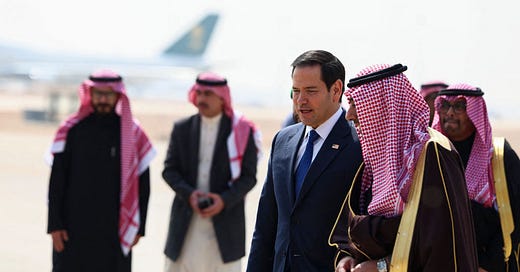U.S. & Russia Head To Ukraine Peace Talks
European 'centrists' still set on dependence and degrowth
U.S. negotiators arrive in Riyadh for talks with Russian foreign ministry
EU leaders hold 'temper tantrum' session in Paris, being shut out of Ukraine talks
They failed to pursue independent leadership; chose to live in artificial construct
Do they prefer war because it masks their economic collapse?
Can continent regain leverage, no longer be dependent and defenceless?
What happens to Zelenskiy now, and will the West get its money back?
(2,300 words or 11 minutes of your company)
Feb 17, 2025
Teams of U.S. and Russian negotiators, headed by secretary of state Marco Rubio and foreign minister Sergei Lavrov, will meet in Saudi Arabia on February 18 to seek an end to the war in Ukraine.
They will do so without the presence of Ukraine or any other European state.
The West European crowd was not amused.
The headlines blared: "Starmer to join Macron-led European crisis summit on Trump’s Ukraine plan."
Peace? Stop that now!
Vice chairman of America First Policy Institute Fred Fleitz said they were having a tantrum.
Sadly, this is not a joke. Europe's leaders appear to favour war at any cost, even if their armies are not fit for purpose.
Why would that be? A cynic may guess that war justifies austerity, and several of the bigger European governments are in a state of financial crisis. Thus given the choice between peace, and fighting to the last Ukrainian, they favour the latter.
U.S. defense secretary Pete Hegseth has said that Ukraine will not regain land it has lost because it is not practical. This means that the war policy espoused by Germany's Christian Democrat (CDU) leader Friedrich Merz or the former Dutch prime minister Mark Rutte, who is now NATO's secretary general, is fading.
Bigger picture
The war in Ukraine must be seen against a broad set of policies, if not failures.
Conflicts in Ukraine, Yemen and Syria are linked by pipelines, trade routes and power play.
Europe’s de-industrialisation and ageing populations mean finance ministers need an excuse to cut public services to the bone, along with health care and education. And war is a darned useful excuse.
No-one knows that better than Friedrich Merz, the former head of BlackRock Europe, running in the federal election of February 23.
It is little surprise that he supports more war, or higher defence spending. On illegal immigration he borrowed the Alternative for Deutsch land's (AFD) policies, while saying he would never form a coalition with them.
Outgoing chancellor Olaf Scholz defends the Green policies and war, while blaming Russia for the collapse of Germany's economy.
Scholz has never questioned whether the high cost of energy might have something to do with closing down nuclear power stations without a viable alternative. He has never questioned who blew up the Nord Stream gas pipeline on which his nation relied for cheap energy — now Germany's biggest brand names, BASF and Volkswagen are leaving.
Like his expected successor, Scholz has come out in favour of increased weapons spending. A special budget of €100 billion to finance German military was only “first step,” he told the Munich Security Conference (MSC). He suggested changing the country's debt rules, in order to spend more on weapons.
Dr Rainer Rothfuss, MdDB, a member of the Bundestag for Bavaria, and of the AFD, compares Germany to a tanker caught in a narrow channel.
On the one side is the policy of isolation, in confrontation with Russia and China, and in alliance only with Brussels and the globalist faction in Washington.
To the right of this channel is Green policy of energy rationing and degrowth.
If AFD came to power it would immediately assist in peace talks and promote Eurasian integration, he told Harley Schlanger. The European Union had been a constraint on Germany's development and cooperation. [1]
Germany being a manufacturer without its own resources is more dependent than most countries on external relations. Rothfuss would even support membership of the BRICS.
Selling out
Crisis, war and austerity is the background against which the British government is negotiating to sell patient data. Could there be a connection?
The National Health Service is on the operating table, along with the valuable medical data of the entire population — an FT headline reads, "UK studies pricing plan for selling NHS patient data."
The value lies in crunching that data for artificial intelligence and research, such as Stargate announced in January by Oracle's Larry Ellison.
The U.S. military is said to have the most complete data set of medical records, but that is 1.4 million people. The NHS is an entire nation.
With the inflow of population from countries like Nigeria, Somalia, Libya, Yemen, Iraq, Afghanistan, China, etc, the NHS data set would only become more complete, and thus more valuable, with the addition of new NHS patients.
Is this one of the financial benefits of war and open borders?
With peace in sight, European leaders still talk war. Germany heads into federal election planning re-militarization. Why the need for crisis & austerity?
Keep reading with a 7-day free trial
Subscribe to Moneycircus to keep reading this post and get 7 days of free access to the full post archives.




